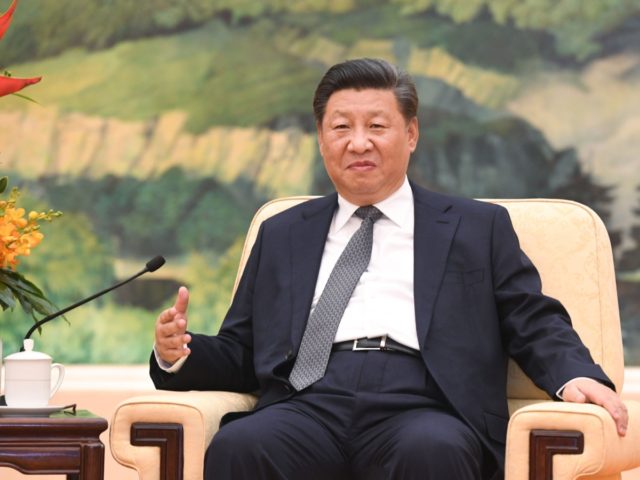China is willing to work with “American states, local councils, and businesses,” Chinese leader Xi Jinping said in a speech on the communist nation’s economy on Monday.
“Opening up is a key driver of China’s fast and persistent growth. It is a basic national policy. We’ll upgrade our opening level, foster international cooperation, and seek new competitive advantages,” Xi told a Chinese Communist Party (CCP) symposium of state economists and sociologists in Beijing on Monday, state-run Xinhua News Agency reported.
“For all countries, regions, and businesses that are willing to work with us, including American states, local councils, and businesses, we must undertake cooperation proactively,” the CCP leader added.
“Beijing used to have cozy relationships with Wall Street firms and American businesses with large operations in China, but that goodwill has thinned considerably in recent years. Among U.S. states, China has traditionally had close economic ties with the west coast – California, Oregon, and Washington – while its purchases of American agriculture products as part of the phase one trade deal have also boosted interactions with Midwest farm states,” the South China Morning Post (SCMP) wrote on Tuesday.
In January, U.S. President Donald Trump signed a “phase one” trade deal with China pausing “a damaging trade war — involving retaliatory tariffs being slapped on billions of dollars worth of goods — between the world’s top two economies that started in 2018,” according to CNBC.
A key feature of the phase one trade deal was China’s commitment to buy at least $200 billion more from America over two years, compared to 2017 purchases. However, recent data compiled by the Peterson Institute for International Economics shows that “[i]n the first half of 2020, China bought less than a quarter of the targeted full-year amount of U.S. goods agreed under the deal.”
Trade representatives from the U.S. and China reviewed the progress of their phase one trade deal in a conference call on Tuesday. U.S. Trade Representative Robert Lighthizer and U.S. Treasury Secretary Steven Mnuchin spoke with Chinese Vice-Premier Liu He. The representatives said that the U.S. and China had made some progress in implementing the deal since its signing in January. The parties agreed to “create conditions and atmosphere” to ensure its future success.
The CCP has increasingly pressured local U.S. governments to promote Beijing’s interests in recent years.
On February 8, Secretary of State Mike Pompeo warned of the troubling phenomenon at a national governors association meeting:
Let me read you an excerpt of a letter from a Chinese diplomat. It was China’s Consul General in New York sent a letter last month to the speaker of one of your state legislatures.
Here’s what the letter said in part. It said, quote, “As we all know, Taiwan is part of China … avoid engaging in any official contact with Taiwan, including sending congratulatory messages to the electeds, introducing bills and proclamations for the election, sending officials and representatives to attend the inauguration ceremony, and inviting officials in Taiwan to visit the United States.” End of quote from the letter.
Think about that. You had a diplomat from China assigned here to the United States, a representative of the Chinese Communist Party in New York City, sending an official letter urging that an American elected official shouldn’t exercise his right to freedom of speech.
On February 22, just two weeks after Pompeo warned of the CCP’s infiltration of local government bodies, a New York City public library agreed to remove an exhibit on Chinese-occupied Tibet after the local Tibetan community objected to the content as CCP propaganda.
“[T]he Chinese Consulate and its affiliate made the decision to discontinue the exhibit, which will be removed,” the Queens Library said in a statement following protests by local Tibetans who said the exhibit’s content attempted to whitewash the CCP’s human rights abuses in Tibet.
In April 2019, California sent its democrat Lieutenant Governor Eleni Kounalakis to Beijing to attend the CCP’s Belt and Road (BRI) Forum. The CCP uses the infrastructure-building BRI to gain a foothold in developing nations, who become indebted to Bejing through predatory loans used to fund the projects.
While attending the CCP summit, Kounalakis heaped praise on the BRI as a means for China – the world’s largest emitter of carbon dioxide – to “drive positive action for this global threat,” referring to global warming.
The Lt. Governor said California had signed “several memorandums of understanding” with Beijing and “built up a partnership based on the shared principle of fighting climate change.”
In September 2018, “China and California held a three-day summit in San Francisco to discuss the issue [of climate change] with the endorsement of Chinese President Xi Jinping, who sent a personal message of support to the governor at the time, Jerry Brown,” the South China Morning Post reported.
The White House
COMMENTS
Please let us know if you're having issues with commenting.